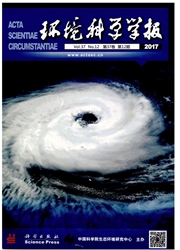

 中文摘要:
中文摘要:
以梅梁湾2010年4月至2011年12月的监测数据为基础,选取太阳总辐射、综合消光系数、水温、总无机氮、pH和当前的叶绿素a浓度等作为输入变量,以7d后的叶绿素a浓度作为输出变量,运用支持向量机(SVM)建立了针对"三号标"监测点的叶绿素a浓度预测模型,并进行了输入变量的敏感性分析.通过模拟值和实测值的对比分析发现,该模型能较好地预测7d后叶绿素a的浓度变化情况.模型输入变量的敏感性分析结果表明,当前的叶绿素a浓度是影响预测结果的最重要因子,然后依次为pH、太阳总辐射、综合消光系数、水温和总无机氮.
 英文摘要:
英文摘要:
A chlorophyll-a prediction model for the Sanhaobiao monitoring site is established by using Support Vector Machine (SVM), based on the measured data of the Meiliang bay from April 2010 to December 2011. The total solar radiation, comprehensive extinction coefficient, water temperature, total inorganic nitrogen, pH and the current chlorophyll-a are chosen as input variables, and the chlorophyll-a in 7 days is selected as the output variable. The comparisons between the simulations and the observations indicate that the model could precisely predict the dynamic changes of chlorophyll-a 1 week later. Sensitivity analysis for all input variables reveals that the current chlorophyll-a is the most important factor to the prediction results, followed by pH, total solar radiation, comprehensive extinction coefficient, water temperature and total inorganic nitrogen.
 同期刊论文项目
同期刊论文项目
 同项目期刊论文
同项目期刊论文
 期刊信息
期刊信息
